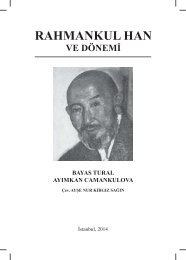THE SOVIET HISTORIOGRAPHY AND THE QUESTION OF KAZAKHSTAN’S HISTORY
SOVYET-TARIH-YAZICILIGI-ENG
SOVYET-TARIH-YAZICILIGI-ENG
Create successful ePaper yourself
Turn your PDF publications into a flip-book with our unique Google optimized e-Paper software.
<strong>THE</strong> <strong>QUESTION</strong> <strong>OF</strong> <strong>KAZAKHSTAN’S</strong> <strong>HISTORY</strong> 121<br />
sides he will be dangerous” 205 shows that this situation worried the<br />
Russian government.<br />
Kenesary also showed effort to establish a regular army. From<br />
fugitive soldiers and officers, he learnt the basics of Russian military<br />
tactics. He divided his soldiers into ten, hundred, and thousand, according<br />
to the old Turkish system, and assigned well-known captains<br />
and majors of Military Board as their commanders. But it is a sad truth<br />
and rightfully reproachable that Khan Kenesary harmed Kazakh villages<br />
even if they cooperated or not, guilty or not. It is understood that<br />
Kenesary did not comprehend properly the political and diplomatic<br />
meaning of the new Kyrgyz entity, created under the leadership of<br />
Ormon Khan in Kyrgyz lands.<br />
Conclusion<br />
In his studies E. Bekmakhanov proved that contrary to the propaganda<br />
of Soviet-era ideology, the inclusion of Kazakhstan into<br />
Russia did not happen by their will but with the use of military<br />
force through an occupation policy. This showed that apart from the<br />
economic damage it caused Kazakh society, colonization also played<br />
an important role in the dismemberment of the Kazakh Khanate. He<br />
pointed out the fact that with the “divide and rule” policy, the Czarist<br />
government provoked Kazakh society towards each other and deepened<br />
the on-going clash. In addition to this, he did not ignore the<br />
progressive ways of the inclusion of Kazakhstan into Russia; he has<br />
stated that this has influenced positively the health and education<br />
sectors, adopting sedentary life, and the recovery in trade. He described<br />
the uprising against colonizing policy of Czarist Russia under<br />
the leadership of Kenesary as national struggle and drew attention<br />
to the important role of the rebellion in the development of national<br />
consciousness of the society. Nevertheless, we can say that he both<br />
criticized the wrong dimensions of Kenesary’s policy and underlined<br />
that this uprising became an example for subsequent civil upheaval.<br />
205 Bekmakhanov. E. Kazahstan v 20-40 gody XIX. veka, Almaty, 1992 edition, p. 291.



